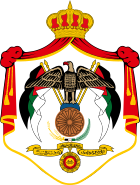|
2024 Jordanian general election
General elections were held in Jordan on 10 September 2024 to elect the 20th House of Representatives, the lower house of the Parliament of Jordan.[2][3] BackgroundOn 25 July 2024, King Abdullah II of Jordan issued a royal decree to dissolve the House of Representatives. This dissolution preceded parliamentary elections set for September 10. The previous House of Representatives had been elected in November 2020. These elections follow reforms that lowered the candidacy age from 30 to 25, and allow for a mixed proportional representation system for 138 seats. The new system allows two votes for each person, one vote for lists running in 18 local districts competing for 97 seats, and another for political parties for the national district for 41 seats, with 12 quotas for the Christian, Circassian, and Chechen minorities, as well as 18 seats for women. In upcoming elections, the percentage of seats for the national district is expected to increase until parliamentary majorities allow for formation of parliamentary governments.[4] On 13 June, the Islamic Action Front, the largest opposition party in Jordan, sent a letter to Prime Minister Bisher Khasawneh, complaining of “electoral harassment” practiced against potential candidates and supporters by the kingdom’s security services.[5] Starting on 16 August, fake election posters went viral showing The Boys actor Antony Starr as Homelander, photo-shopped to look like a politician being plastered across the country to satirize candidate Khaled Musa Issa Abu Hassan's strategy of putting up an unseemly amount of posters to cover up most public spaces.[6] Just two days before the election, a Jordanian truck driver killed three Israeli guards at the country's border crossing with the West Bank, in the first such attack since the 1990s.[7] Electoral systemThe elections were the first to be held after a series of constitutional amendments and a new electoral and political parties laws that enabled new changes, recommended by the Royal Committee to Modernize the Political System. These new changes include lowering the candidacy age from 30 to 25, and allows for a mixed electoral system. The new proportional representation system allows two votes for each person, one vote for open lists running in 18 local districts, and another closed list for political parties for the national district. Out of the 138 seats of the House, 97 are for representatives from local district, and 41 for representatives from the national district, with 12 quotas for the Christian, Circassian, and Chechen minorities, as well as 18 seats for women's quota. Despite the quotas, these groups can also compete in non-quota seats. In upcoming elections, the percentage of seats for the national district is expected to increase until parliamentary majorities allow for formation of parliamentary governments.[4] Election937 candidates on 172 lists ran for the 97 seats of the 18 local electoral districts, while 686 candidates on 25 lists belonging to 36 parties[which?] ran for the 41 seats of the national district. There were a total of 5,115,219 registered voters. Polling opened at 07:00 and closed at 19:00.[8] Results
 Islamic Action Front 10–20% 20–30% 30–40% 40–50% 50–60% Jordanian Communist Party 20–30% Total seats
National district
AftermathThe Islamic Action Front saw significant gains, winning 31 seats; however, this was not enough to win a majority outright.[7] This was the strongest showing for Islamist parties in parliamentary elections since 1989.[11] Etaf Roudan, a Jordanian journalist, stated that the IAF's political position on the Palestinian issue had pushed leftists, traditional nationalists, and tribal forces to vote for the Islamic party.[7] This stance was reflected by Murad al-Adaileh, general secretary of the IAF, who said that the election results showed "The next House of Representatives must be robust in confronting the extreme Israeli right, which may, in the future, align with the extreme American right if Trump wins the US elections."[7] France 24 reported that the "nearly half a million votes" the IAF won was "unprecedented in their history in Jordan."[12] Adaileh also claimed that the election results were a "popular referendum" for Jordan to scrap the Israel–Jordan peace treaty, and to back Hamas.[13] On 15 September, Bisher Khasawneh resigned as prime minister. In response, King Abdullah nominated his chief of staff, Jafar Hassan, to form a new government.[14] References
|
||||||||||||||||||||||||||||||||||||||||||||||||||||||||||||||||||||||||||||||||||||||||||||||||||||||||||||||||||||||||||||||||||||||||||||||||||||||||||||||||||||||||||||||||||||||||||||||||||||||||||||||||||||||||||||||||||||||||||||||||||||
